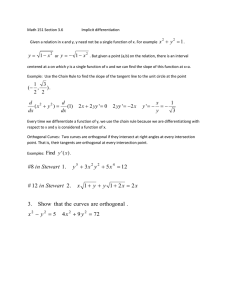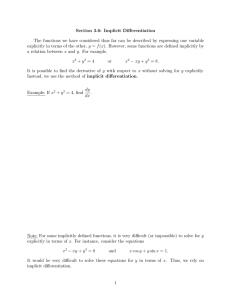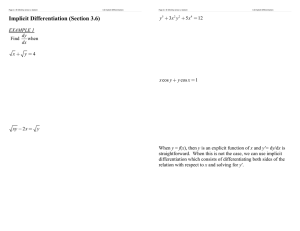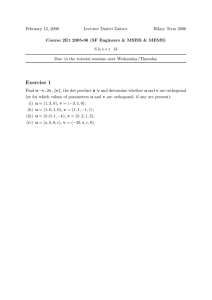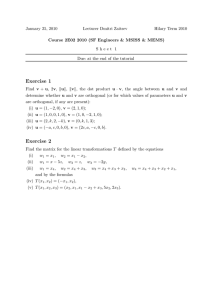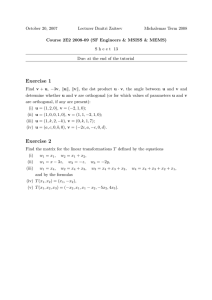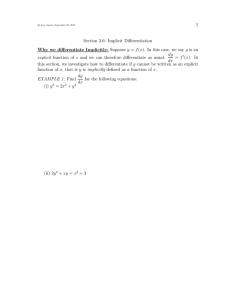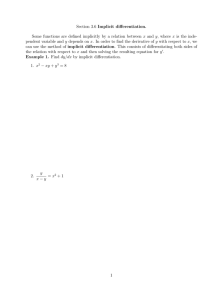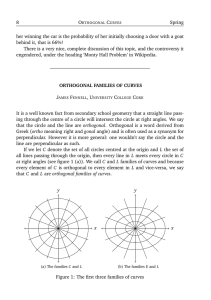Document 10413711
advertisement
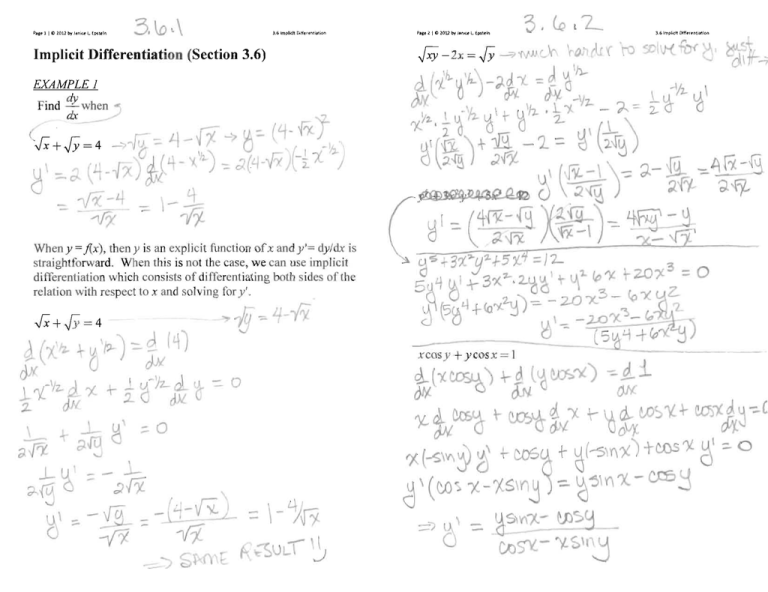
Pag~
3.~\\
1 J lID 20U by Jan ie.. L EpsteIn 3.6 Implldt Dll'I'e,entiation
(
~ .fx +..JY = 4 -..,~fIZ =- t.j - {1 -> ~::;. (+ fX. ~ \ -;.. J. (~- -fX'ft
~ 00 d. (t.j --.R )ri-;{ I
.
'(
'(If)}
,U
.
3.6 Implicit Dtffl!rentiatlon
.JxY - 2x = fY ~ GV\ 'rlJh tV f 'ro Ill. ,\
J
J
\A Ill-
d. {~- uft.) - ~(j\ -x. ::. G Implicit Differentiation (Section 3.6)
EXAMPLE 1 dy
· d -when
FIn
dx
3.tc,.L
Pale 2 J 0 2012 by J.. n'~ L EpsteIn ;1;pt - "'-)
I
\
rx.'/2. I
\
tJ¥ -V1-
L
t
L\\(k')+~
-
();2."E
~ fi-4'~ _
-'In' - ,-3­ -
Wheny = j{X), theny is an explicit function ofx and y'= dyldx is
straightforward. When this is not the case, we can use implicit
differentiation which consists of differentiating both sides of the
relation with respect to x and solving for y'.
-\I
I~ r"" ~
Oii·
~
T
U\h 1.. "t.
U
2-
-2=
JfX-
\
..y~
_ 1. u
.-- ~ \'
~\~)
z.. cr
(\~ _ \' -::: ~ _ ~ -::. t1 .~ -§
~ \ -;2 'i )
~fY.I =- (4fiil- BY!'!/-\ -=- ~ -:
, ~\fX j\'fi.-\)
3
'6 q1. Ip 'X t ZO?' =0 ~ ~~4 -1- Co')(2-.::f') = - Vyx.3 - ~ X Z.
0)(,.
0
1. r{Yz- J. "1.-.
,..
rJ
1-
J. u: -Yz- d
C1
:La
dU
d.'
l-u' -- J.­
~(U C -
dfi
"-l-::-~~ ) = \- Lt;A -
.2O'X.=>-
r~
~5~'H(P1( J'\
-
"U
) -=---­
-:::..0
r
u, ' ;;.0
.L
~,
_
-
(It)
g. '11­
")(- q
~ 'S +31~!:J'J..j.51-'f =} 25 )J..'1 ~' -\- 3?("', ~ I T
I 1 \ _
V-f7-. -\- IA \~) ~ 0.
\
LJ G
n
~+ JY= 4
"" I
rJ>I-'X ,...
rt (-S\V' \~~ v~ 1- cos
~ \ ( u)..,
-::=1 ~\
U
'C.t.~~;\l ~
+- ~r-S'nx ') +~ ')( ~\ =- 0
-x - 'X51nj
-::. ~ '5\ Y\ 'X. ­
=- _~~' Y\'j...-
~S f' ....
J j -:.C
cv- ~S\f~ 3.(0,3 Paie 3 I CI 20U by J.nlc. L E.psteln
3.6 Impllclt DifferentIation
Pagl! 4
l
~
J..
,.\
fl.
J3
(:;,'~
~~
OJ,
(-x:1:\~'2 ,(?-'X X .j-2y) -
-\-
d. 0. ,,! U '",i I
v
01.)
~oL 7.._ '-l ~ l~{:Ht .
"I.- L\",z 1')(2- 11.. -7. ~ 1'-,:1
X
+ y 2/3 =
4 at (- 3J3",1) '"
H
..
.".. ,
~
I
~
e
1
·2
..
~r
[~-s~~')d ~.
.A
_
•
/'\
.J '
u- \
(J'
/'
2(3)
Two curves are called orthogonal if at each point of intersection
their tangent lines are perpendicular. Two famili es of curves are
orthogonal trajectories of each other if every curve in one family is
orthogonal to every curve in the other family.
EXA MPLE 5
S~ow ~h at the given curves are orthogonal
x - y = 5, 4x 2 +9 y2 = 72
•
?
I
OJ'
)
((:=­ -
3 'B J ~ -:::. \
/ -;(r.;-;
. --,
~ = -- ~ /~ -1/35/,.'
-
\
-f3
~*(X+3{3\
\~3
)
~~~'X-~4-
/ (~~('.cl.~ Vf\~
:1
tits
3
.5
~~
.2
_\
•
<
t
"' f
',
1
2
1
"\
7.. ~
.~ ~~-~ ~
Lf'X'2 t q (1("--s j": 11­
\3 ')( '2. - L\ c:s 1 '2.. -"I ')L1.- ~ 4
"2.-
/
2+
~\ ~ -~!{i
I
2
(-5> \ ) . ~ \11 tv'
9­ - 'fO
'2..'" l J3 \ 0
-rX..
-\--4..
\1-=­
~
30
0
6,
~ C' b
I
I _
EXAMPLE 3 Find an equation of the tangent line to the curve at the gjven point. 2/3
~3)
'T •
() ~'(3)~-1z.. :0
AI. 2-
S
~., ~ .t~)f)'(3)+)2.
6Qlt~; \ \"L ::. ~ t,' (3) -r~4 L
J .,
3.G Implicit Dtfftrent i.tlon
d- \~) ~\'~') 1--.;L1- == -X1- q ~'J 4- ~ (i<) . 2 ~
=3'2.-8 r (:3»+
L ] )
\01:­
(X2 +y')2= ax2Y-')d~q~ ~ OJ ··~ 'lJ (~Z.+~t-J~ l1hi2-) : O:',('Z.~'c\ ~~~o.
(rx.j. +u2.)t)'Xd/f..\- ~ ~\ D-t- +- C\J 1.'i~
1.
3,~.4
.ln
EXAMPLE 4
If [g (x)t +1 2x =x2g(x) andg(3) = 4, findg'(3).
EXA MPLE 2
Regard y as the independent variable and x as the dependent
variable and find dx/dy for
'X. -~
I CI 2011 bV JanIce L [pm
•
5
0::.
"
....
~ { x::: ± 3
:
t-~1 ~,Al""
\
-+ (j'W'r\ls
~2. =. .i1-·- s = q- '5 ::;. '-I ~' ~ ± ~
JIx'1..- ~i.) ::.id5) J,'Ji. - Ld ~ =- ~\~ ~
-::0
...:;>
I) -'?
')(/
d ('\'x.'I..(.C!()/l7..\ -::.ci(12.)
-i '0 ')L -I <6u u: ~ 0 -"Il,I~ "","-1:£
tYi
<so
a '1!j
C9 (31~) ~\ == '3/z- ) ~~ '" -~\~~ ::: - ~ -;) ..L
!W.
(e~G )
3tVt \ 5
Page SIC 2012 bV Janlea L [p$lein
3.6 lmplkit DIffere ntiatIon
EXAMPLE 6
Show that the given families of curves are orthogonal trajectories
of each other. Sketch.
..-r
\ I
Y = ax 3 , x 2 + 3y2 = b
\ 0 S\6-'it:A\ ~
l.t\- a:. \ )\0-::-\ ~
5i
~\= 1-'"
5
4
ex: -\- 3 ~~-=- \ 6
1 '
-4
4
-\
-4
\0 -=­ \ to
-5
-"+
-5
\
~\ ~
30.
1"1
~'ll -\--G~ ~~ =
o'(1),e~
~l
a.fr
-:0 -
0
J-
~ ~ ').."l­
x
.2:
?'0
\N)~G~ \ SAW\e. (-Xl ~J
....... , =- - ::i-
-;:;: / ll-z.
o
3 ( o:!~3 \
-=~ -;:: - J- .. . .L
30.,.'x.2 ­
